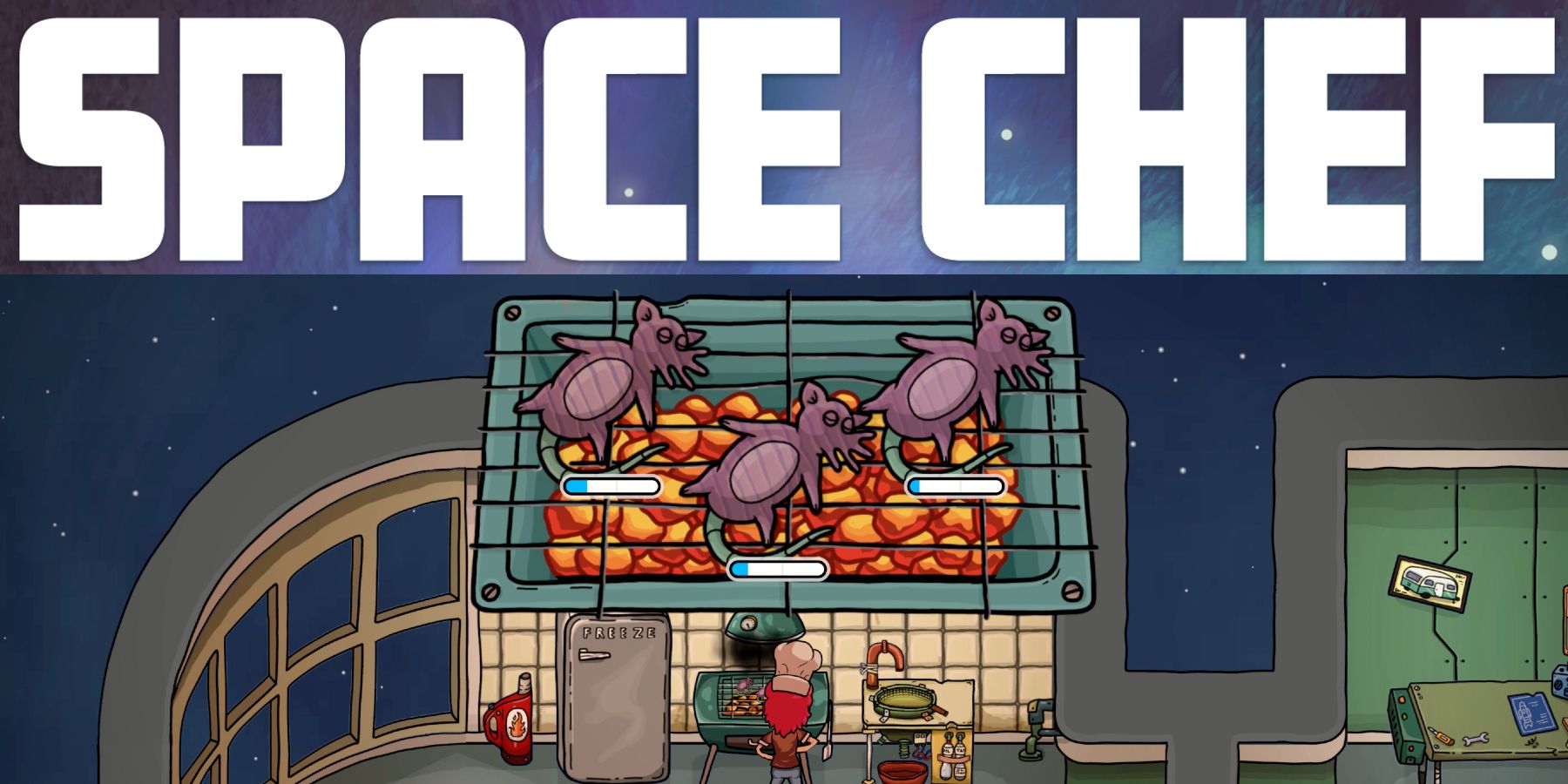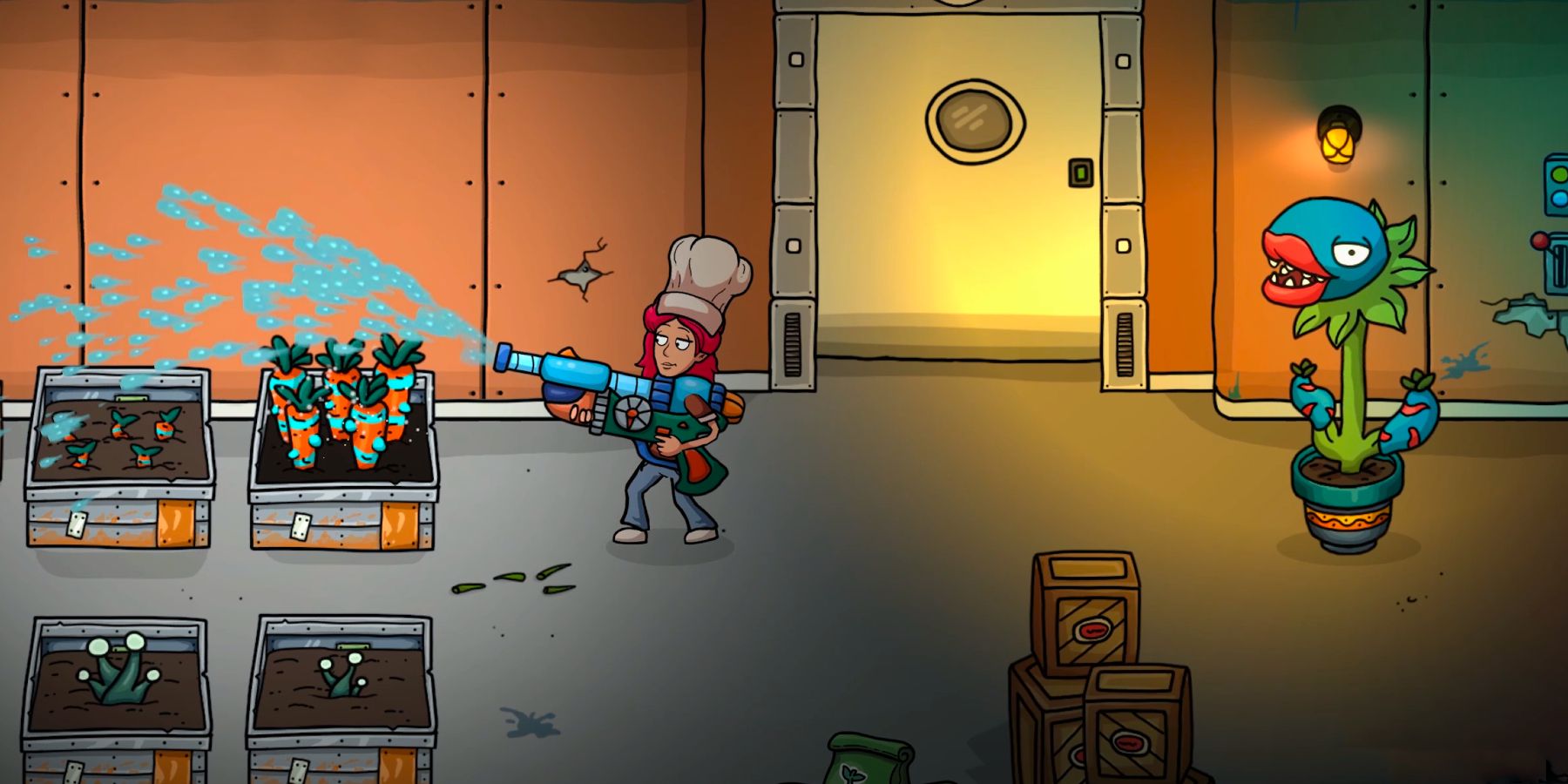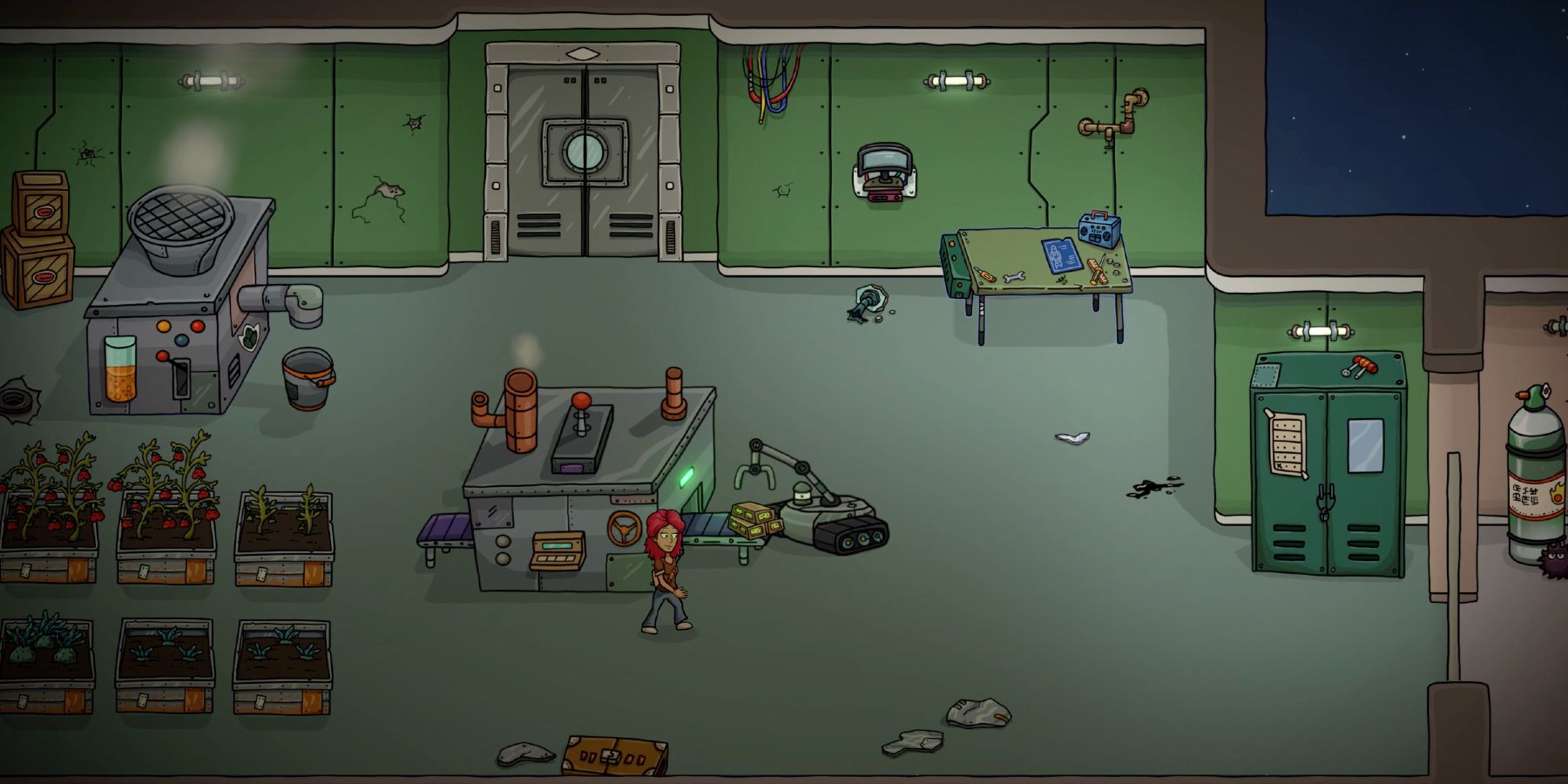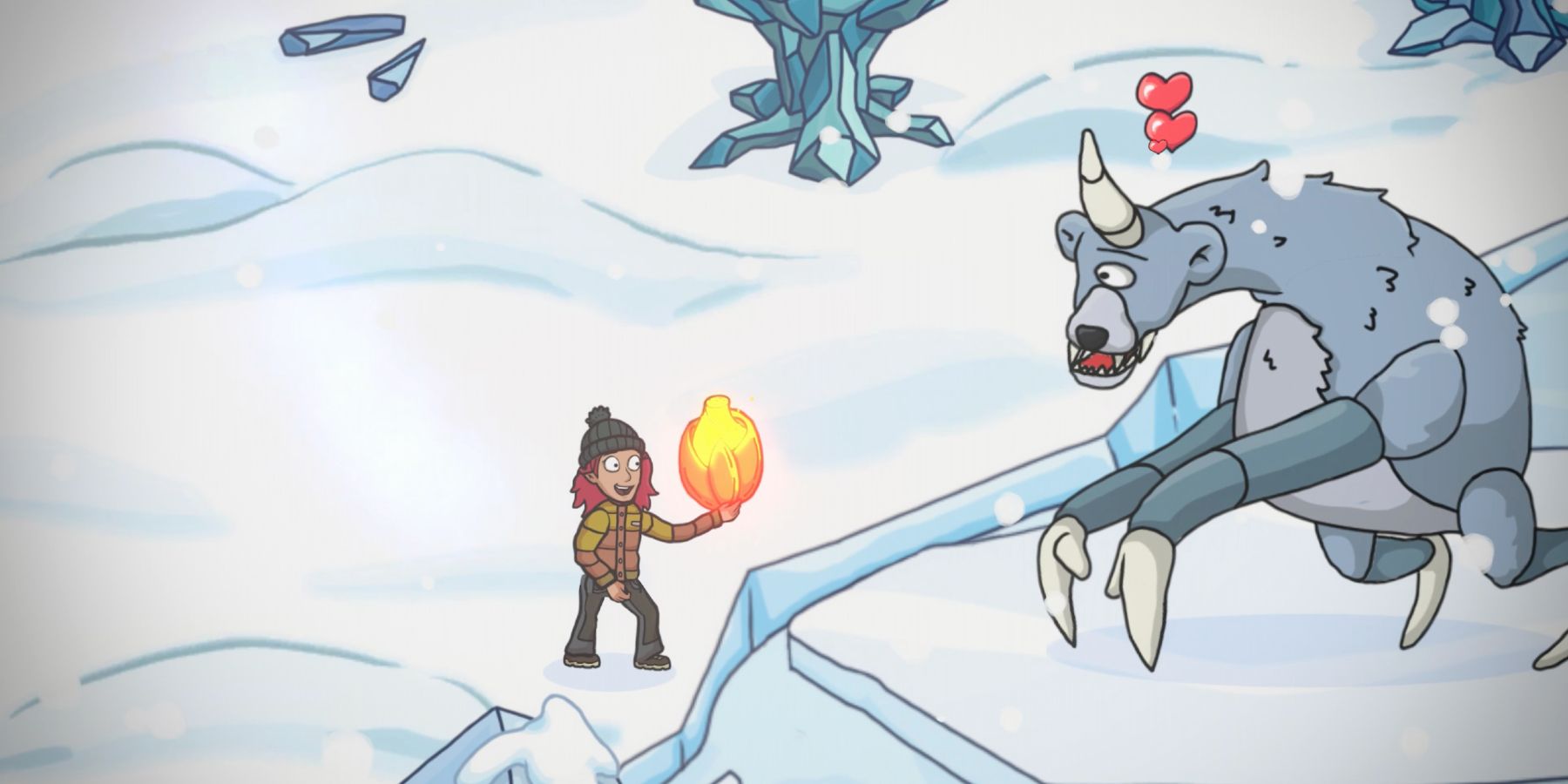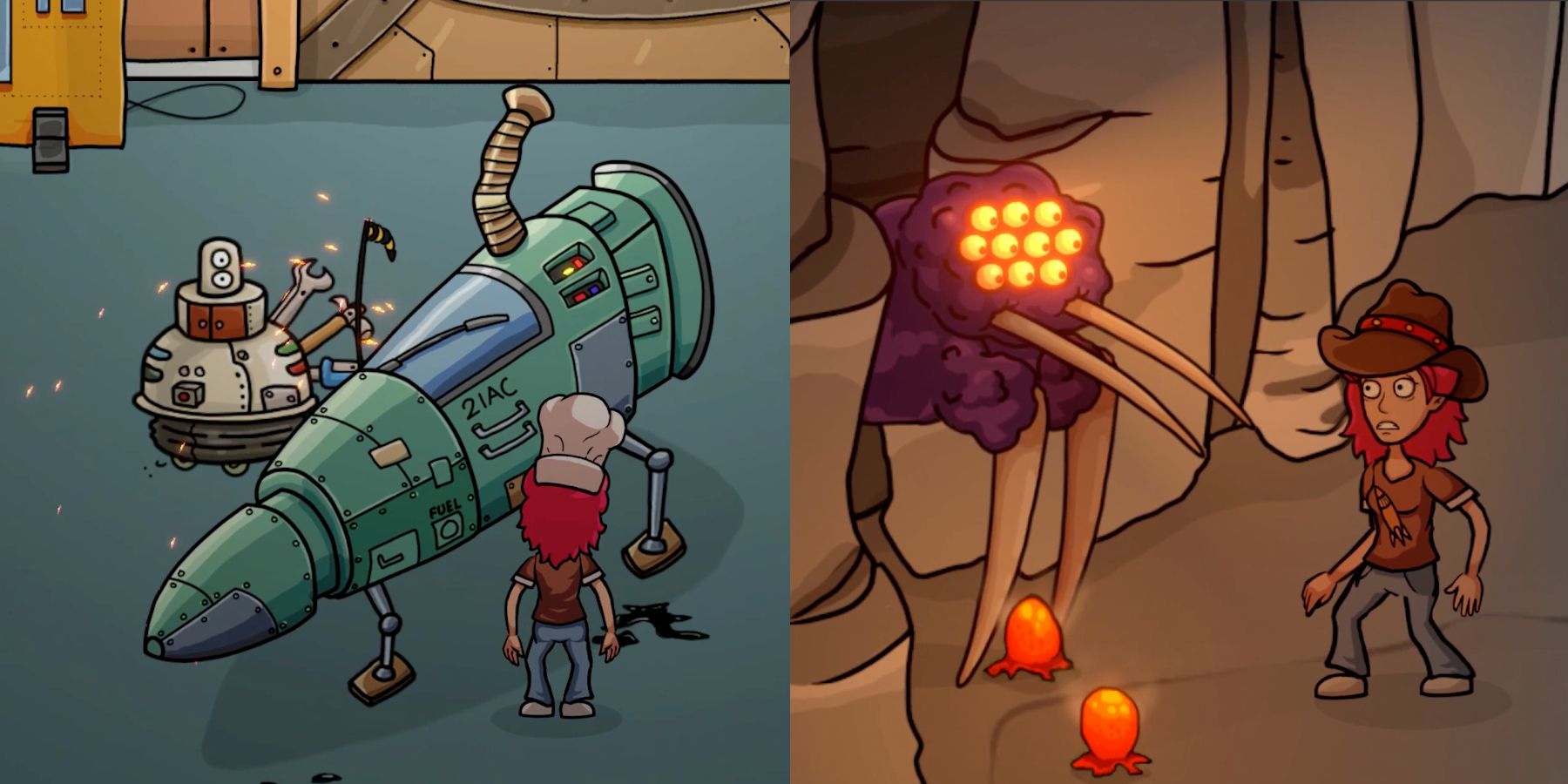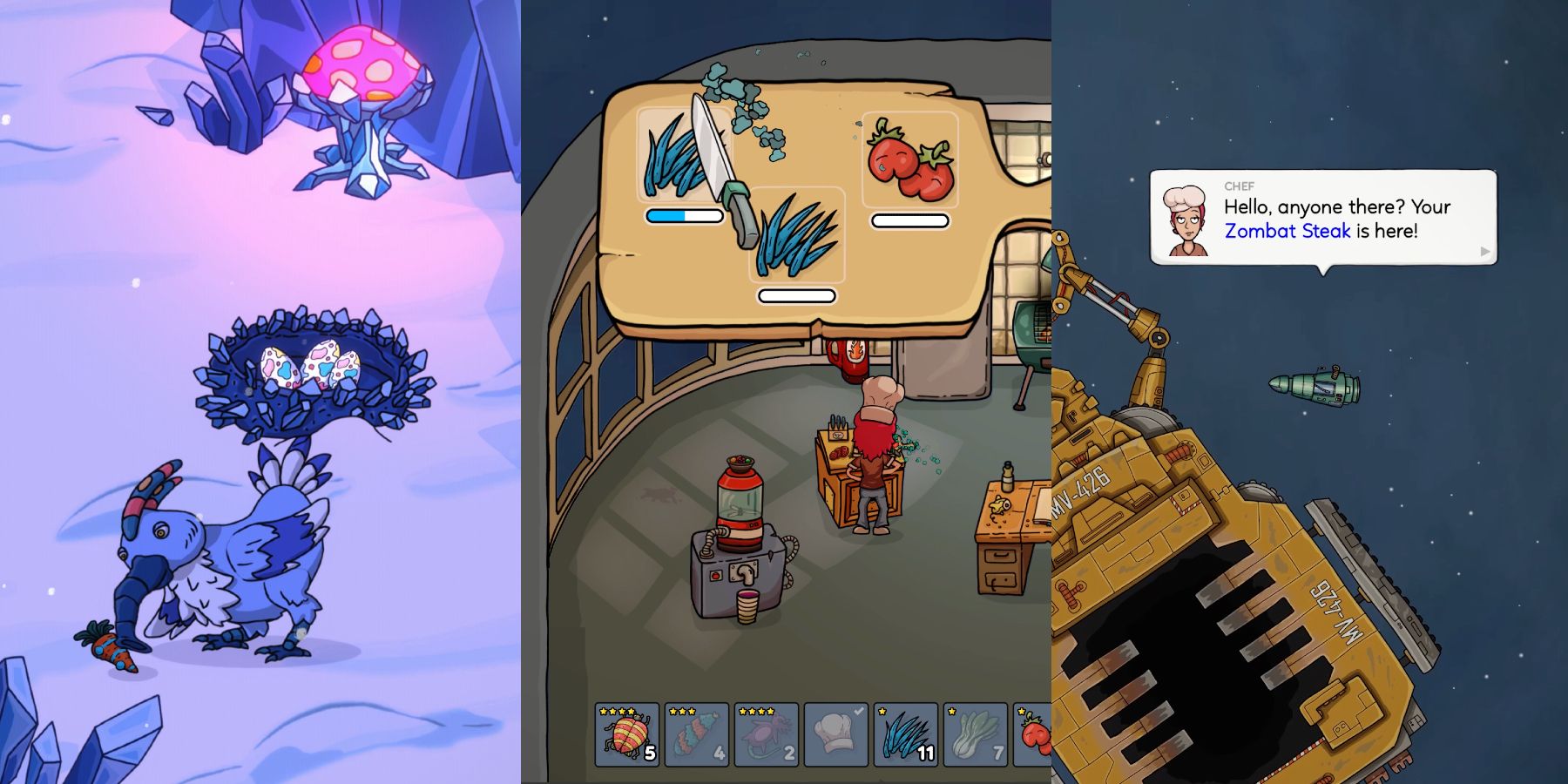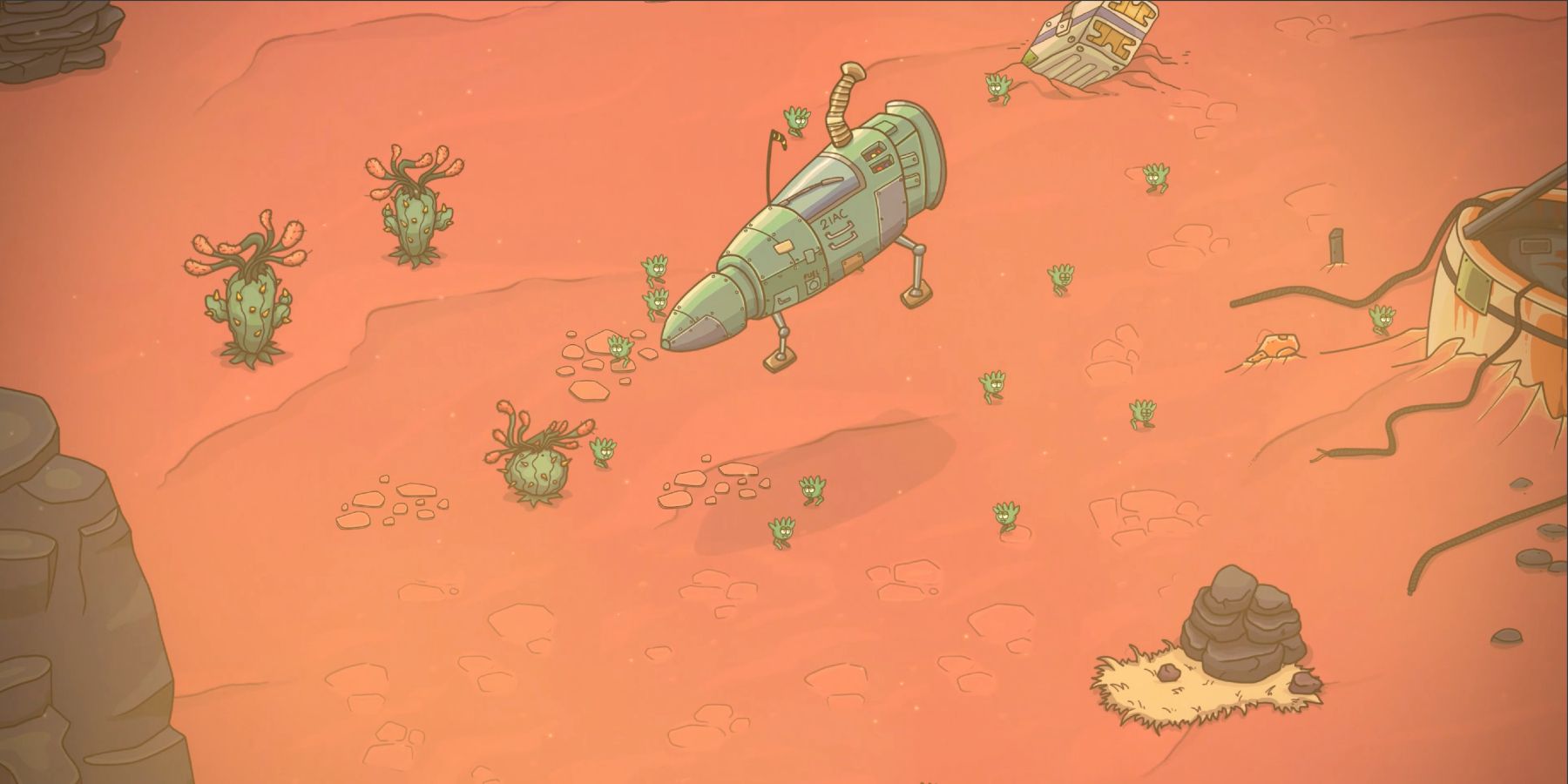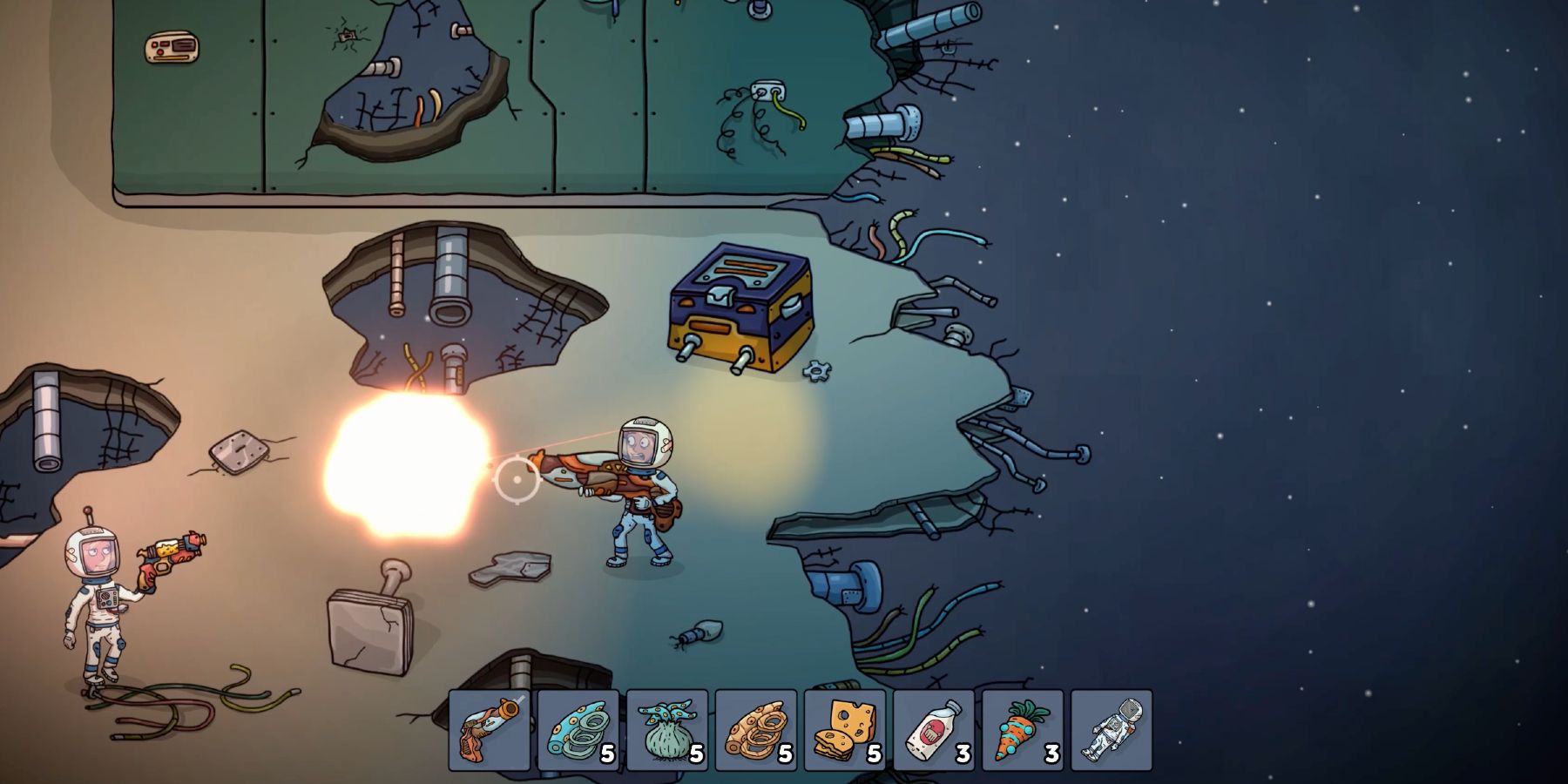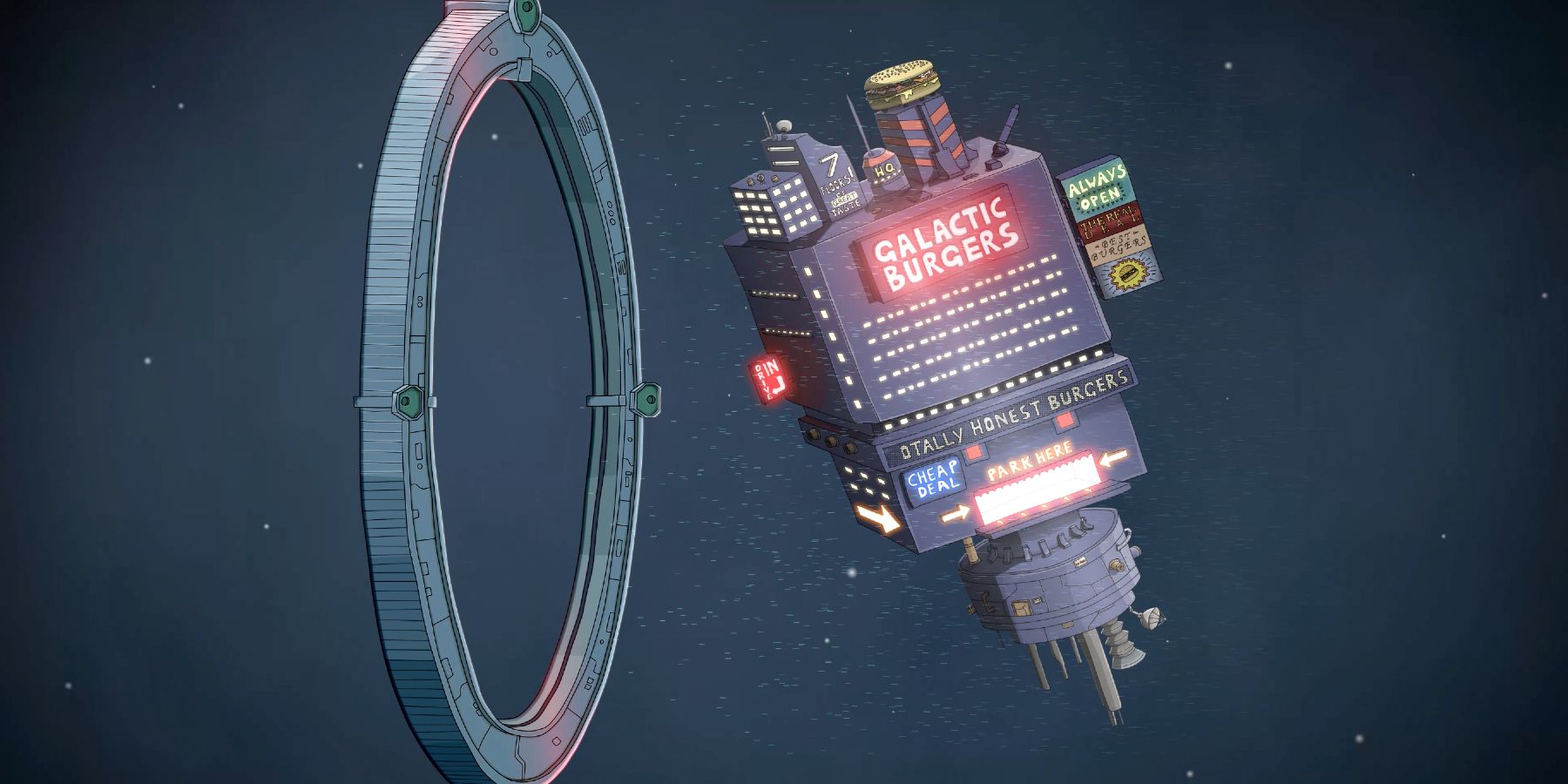Space Chef is a hybrid action and cooking game that sets players out on a quest to become the greatest chef in the galaxy. The heads of Swedish indie developer BlueGooGames pulled together a bevy of sci-fi influences to create a world as dangerous as it is opportunistic for anyone driven to explore. Though the game's development roadmap doesn't peg it for release until late 2023, an ongoing Kickstarter campaign has raised over double its $20,000 USD funding goal to help get there.
Game Rant spoke with BlueGooGames' project lead Niclas Marie and creative/art director Tobias Tranell about Space Chef's Kickstarter campaign, what influences helped build the game, and the duo's history as friends. Interview has been edited for clarity and brevity.
Q: So what is BlueGooGames, and how did it get started?
Marie: Would you like to start, Tobias?
Tranell: Well, BlueGooGames was Niclas' invention and I don't know why he chose that name, but I joined and rolled with it because it sounded fun. We tried to tackle a couple of ideas early on, because we've wanted to make a game together for a while. He's good at scripting and I'm good at the art. So we tried some concepts, came up with Space Chef later on.
Marie: About the name, it just sounded fun. "Blue Goo," it rhymes. Nothing very deep.
Q: What concepts were you tossing around before Space Chef?
Tranell: We tried some Metroid-y games, we tried some pixel art games, we wanted mobile games. It didn't feel right, any of it. Then I read a book for my two children at the time. That book had a particular cartoonish style that I liked, and I said, "I can draw like that too." So I drew a hamburger and showed it to Niclas, told him we should make a game out of these graphics. Niclas said, "Sure, I like it."
Marie: Yeah, we started with the art to make something unique. There's so many 3D games, so many pixel art games, but not so many cartoonish games. We really like that style, but we tried a few different concepts like car games or tower defense games, even some online multiplayer games.
We wound up with something that eventually became Space Chef, though it just started off as something about space. We like space, we like sci-fi and humor. One inspiration was Space Quest from the late 1980s - I don't know how old you are but a lot of people haven't heard of it. It's about a guy who's a janitor on a space ship that gets invaded by aliens. Everyone is killed except him, and the adventure starts. Space Chef was originally about a chef in a similar situation, but it turned out we liked the concept of cooking games and wanted to combine that with more action.
Tranell: I liked the idea of scrap-built parts, junk, a space full of replaceable parts where you can craft your own things. We also drew inspiration from space western television series like Firefly and Serenity. I love them.
Q: I did look at the Kickstarter page, and saw the game also draws from cartoons like Futurama, Rick and Morty.
Marie: We like a lot of the humor in those shows. Like, Stardew Valley is a great game with a deep story and characters, but we wanted to make something similar that was more lighthearted. More fun, not so deep if that's the right word, but still enjoyable.
One thing from [Stardew] is the interaction between characters. A lot of action games don't have that as much, and cooking games like Overcooked have no dialogue. We tried to mash it all together.
Tranell: To be honest, we had no idea what the game was about to be when we started. It grew on us, and we're still tossing ideas around. Today we have a pretty clear picture of what it will be, though.
Q: How difficult was it to graft the grungy, maker sci-fi concepts together with that lighthearted humor?
Tranell: Well the style and art is kind of comical we think, with vacuum machines and Futurama-inspired robots, so it kind of went with itself. The mechanics took inspiration from Stardew Valley, Don't Starve, and automation games, so we had a clear picture. I think it's a good mixed bag of everything.
Marie: I agree. I also feel classical sci-fi games have a lot of greys, a lot of metallic and boring colors. We want our game to be attractive for everyone, so we added a lot of color in to make it look more fun.
Q: Going back to that art, what was the book you said Space Chef's style was based on?
Marie: The books that inspired us are by Swedish artist Kjell Thorsson, like Here Come the Robots! The first concepts of the game looked just like that book, but now it has transformed into something else. The idea was it would be sloppy drawings where everything is slanted, not perfectly straight lines. Now it's made from cleaner images.
Q: It reminds me a lot of Flash games, Newgrounds-era work. Did that play into the design at all?
Tranell: Nope!
Marie: Actually it did not, no. We've also got people saying it looks like a scam Facebook ad, like those games where you have to pull out pins. It's nothing like those though, so I hope that association doesn't grow.
Tranell: The thing is, we took that style and mixed it with some of Unity's lighting and ambient effects. It turns out nice in the end, I think.
Marie: Lighting makes a lot of difference.
Tranell: So it's not entirely 2D, there's a lot of effects and atmosphere, lighting, other layers on top of that to make it more appealing.
Q: Is that the reason you decided to work in Unity?
Marie: No, in I think 2016 my wife's little brother was making a game in Unity, so I asked about it and he showed me the engine. I'd been programming a lot in different languages, but never Unity. I started fiddling with it and realized we could make a game with it. That was about two weeks before I started seeing Tobias a lot again, as we've been friends since we were kids. I realized we could actually make a game this time, something we'd tried 10, 20 years ago in different engines but never finished beyond prototypes.
Now we're about two-and-a-half years in, and we want to work full-time on it.
Q: So what kind of experience do you both have in the games industry before this?
Marie: Only as an amateur for me. I've been working in programming professionally for 20 years, but not in the games industry. Just in the last two, three years I've started talking with people on Twitter, getting to know them. Once we had an art style for our game we started posting pictures of it, and realized people like it.
Tobias, you have a little more experience.
Tranell: Well, I'm a gamer. I've played games all my life, which I'd say is my biggest experience. But I've been creative since I was a child, creating worlds, playing and designing mechanics for roleplaying games. I started work as a mapmaker for a roleplaying company, and then I wound up at several major companies. I won a gold Ennie award, so at that time I was quite decent with Photoshop I'd say.
As Niclas said, we've tried to make games in the past.
Marie: We've also made maps for games like Counter-Strike.
Q: Since it's come up a few times, how did you guys meet?
Tranell: We played Nintendo in school, the third or fourth grade. I was trying to solve a puzzle in Zelda and knew Niclas had played it as well, so I had to ask him for clues. He helped me out, and that was the start of our friendship.
Marie: Then we grew up together, went out to parties, or sometimes we just sat around making games.
Tranell: I also think we complement each other because Niclas is all about statistics, programming, and business, and I'm more of a creative guy with art, feelings, ambiance, and story. We're a great team.
Q: And I understand you're not the only ones working on Space Chef.
Marie: We have a couple of programmers and an artist, Tanya Tengri, who has been with us since September 2019. That's when the style really became what it is now. She's a great character artist and creature designer, her creatures are so creative that they help us come up with the idea for worlds.
It's mostly the three of us, we've designed everything together, but then like I said we have some programmers and animators as well.
Q: How did Tanya get roped in as the big third member?
Marie: I looked for an artist on different forums and had auditions with about five people. We sent them an empty screen Tobias had drawn and asked them to fill in the details. Tanya did a super amazing job compared to the others, none were even close.
Tranell: We also wanted someone who could draw my style so it would be consistent through the game, and she did that easily.
Marie: The style evolved because at first she made it look too good compared to our sloppiness, so we had to meet in the middle.
Q: Your Kickstarter describes Space Chef as an open world/galaxy with a bunch of planets. How much variety is there, and how difficult is it designing that range?
Tranell: When you start any game you'll get a unique experience from the next. We'll have some procedural generation, so in one game you may start beside an asteroid field, but the next you'll start beside a planet. You'll have a chance to play in a different way, and you need to adapt to what's around you.
Marie: One thing we're paying a lot of attention to is the different creatures on the planets. Each planet has its own ecosystems and puzzles to solve, such as needing specific eggs but having to find ways around certain creatures to get there. Combinations will be different every time depending on how the planet is generated.
Sometimes it's easy to get a specific ingredient, but other times it might be hard. A planet you need may be further away sometimes, so you'll have to upgrade your ship to get there, which means you need to find the right metals. Still, we tried to make each planet unique, not just using colored animals. Lots of different creatures with unique AI and interactions.
Tranell: It's also great because it's in space, so there's no limit to how much we can add. We can add planet after planet, moons, asteroid fields. It's all up to our creativity and inspiration.
Q: Even with procedural elements in mind, how big will the map be? For the galaxy, each individual planet, etc.
Marie: We haven't specified exactly how big it will be, but the slogan of the game is "hunt, cook, deliver." Every day you go out to hunt, then back to your base so you can cook, and finally deliver the meal. Since that's the gameplay loop, we felt it shouldn't take too long. On each planet you shouldn't be around longer than 10, 15 minutes, so they don't have to be huge. Different parts of planets can also have unique things.
We think it's more important to have interesting content than huge planets with the same, repeating everything. It should be a more intense experience each time.
Tranell: I think we'll add maybe four-to-seven different planets. As Niclas said we want to make each planet unique and a different experience every time you land. Aside from the planets, in space we'll have abandoned space stations to find valuables or action, parts for crafting. Then we'll add wormholes, portals, or mysterious devices to take you further into unknown space. While we haven't decided on the scope of it, we have a map.
Marie: The size of the map really depends on how fast your ship is, but it will also probably be tweaked as we add more to the game.
Tranell: Basically, the further you go, the more rare and dangerous things you'll find.
Marie: But it's nothing like No Man's Sky where you'll find 16 trillion planets, it'll be fixed but with randomized contents.
Q: What about the size of the cooking system? How will its different recipes help encourage replayability?
Marie: There are currently a set amount of recipes, and as you find ingredients you unlock new recipes. We're discussing ways to maybe let people create their own dishes, but haven't figured out exactly how. We think that could be an interesting way to add replayability and give players something to share with friends.
We're also thinking about vegetarian and vegan styles as another path to take. You can choose a lot of ways you want to play, if you like action and just want to shoot pirates you can do that.
Tranell: At the moment we have a lot of art, something like 30 dishes using weird alien things like Ratoids and Mushglooms. So the art is there, and it's quite easy - Tanya is good at whipping up new dishes fast.
Marie: But just adding 500 different dishes doesn't make the game more fun, we're trying to make everything feel different.
Q: You want each element to be more purposeful.
Marie: Yeah.
Tranell: All the dishes have their own ingredients, but some ingredients go in several dishes. We've played around a lot with the names of foods and ingredients, often taking a word and twisting it so it sounds like something from Earth. We want people to recognize what it is and how it could taste, but still let it be alien.
Q: You touched on vegan and vegetarian options Niclas, and there's also going to be character creation and relationship options. What all have you done to make the game accessible to all?
Marie: One thing we've thought about a lot is not having people choose whether they want to be male or female. You can choose different bodies and hair to create the character you like, there's no need to set a gender on it - we want to get everyone included and feeling welcome.
Q: How important was it for you to capture that, especially pulling from games like Stardew Valley?
Tranell: We're very open-minded, Niclas and I. It just felt good, felt right to do it that way. You don't need to choose or define anything, there's no reason to.
Marie: The biggest problem is I know different languages have special rules for masculine and feminine words, so I'm not sure how we'll solve that practically. It might make things complicated, but I'm sure someone has solved it and we'll be able to look at what they did.
Q: Are you planning to work with anyone on localization?
Marie: I have a lot of contacts on Twitter who work with inclusion or LGBT representation. All kinds of people are welcome to play our game, and we're open to discuss how we can make it more inclusive with feedback.
Tranell: On the team now we have Tanya from Russia, we have someone from Greece.
Marie: Also someone from Pakistan. We have people from all over the world, all different genders. There's no discrimination based on location, gender, or anything.
Q: What about accessibility options for those with disabilities or other reasons it might be hard to play?
Marie: I was actually surprised by a recent game I played where the first screen let people choose text size, colorblind modes, and more. I like that a lot because not everyone can or wants to read small text. I think we'll try to talk with special organizations, because everyone should be included. That said, some things are harder. If you're blind, can you play the game? I'm not sure if it's possible, but we'll try our best to let everyone play.
Also a lot of translation work. My son, who's seven years old, said we should make the game in Swedish so he can play, because he plays Zelda but can't understand the story in English. We'll be hoping to hit as many languages as we can, within reason.
Q: On Kickstarter you say one reason you're raising the money is to hire more help. What other reasons did you have for crowdfunding the game now?
Marie: I've been studying Kickstarter for about two years, reading articles and watching videos about it. Our goal was mainly to build a community and involve them in making the game. I tried making YouTube developer logs and some got lucky, but it was a lot more work than it might have seemed.
Already thanks to the Kickstarter we're at about 350 people on Discord with a lot of interest in the game. We like sharing early bits with them so they can get feedback. I think that's an important part of Kickstarter.
For the money part, we've been investing our own money so far on contractors for art and programming. Making a game when you're more than one person costs a lot of money, and we've been talking with investors and publishers. We're not sure what path we'll choose, but the success of the Kickstarter is proof that our concept works. It's a good way to get the game started and get attention.
Q: What has your reaction been to the Kickstarter success? It's already almost double its funding goal.
Tranell: I'm honored, I feel amazed by the response we've gotten so far. The idea of having people like our game is totally new to me, I've never experienced something like that before. I'm very humbled by the people who enjoy our game.
Marie: The people are so kind as well. There are some trolls, but there's so many positive people that it doesn't matter at all. It's helped me realize we've found a niche combination of genres that people seem interested to explore.
Tranell: We're also keen to answer questions and make sure everyone feels involved so far.
Q: How much more will that success let you develop?
Marie: Like I said it costs a lot to make a game, and how much we get will determine how much time we can spend. We'll finish it and make it as good as planned, but we might add more features if we raise a lot - still keeping within the scope and release date.
How much we get here doesn't matter a lot, because if we don't make enough we can talk with investors or publishers to finish it.
Q: Do you have a release date set?
Marie: We're aiming for Q3 2023, that's our current plan.
Tranell: We also have an Alpha and Beta planned, and the Alpha would start in Q1 next year.
Marie: That should be fun, we have more than 130 people who have pledged enough to access the Alpha because they want to play the game now.
Q: Another mechanic I wanted to ask about is your advertised couch co-op. Will there also be online?
Marie: An online option is expensive and complicated to make, so it isn't part of our current plan. Depending on how much we get from, say, an investor, we could add multiplayer online as well.
As it stands now, you can use Steam Remote Play to do a couch co-op game online with friends, but that doesn't include consoles. We'd love to include something online if we can, it'd be cool.
Tranell: We want to make the game four player at least, because we think families can play together.
Marie: Personally I like couch co-op games better because I get to see my friends, talk with them. But I know a lot of people like online as well, so we'll keep it in mind.
Q: How is the co-op going to work? Is everyone an individual character?
Tranell: Our idea so far is players live on the same space station, but they have their own room with control over decorating, painting the walls and whatnot. Then they share other rooms like the kitchen, and from that space can go out individually - or together - to explore.
Marie: Having four players at the same time can probably be messy, but it's also fun. Like in Overcooked when four people try to use a cutting board at once.
I think it's important that everyone can do their own thing without being constrained by one screen. We're probably going to ramp up the difficulty if there's four players at the same time, like giving shorter times to finish an order. That's not defined yet, it'll come as we develop the game.
Q: Back on the subject of community, what is the game development scene like in Sweden?
Marie: The Swedish game design scene is big, there's a lot of people here thanks to big Swedish studios inspiring kids to go to school. But we didn't go to game dev schools and don't have a proper education in that sense. I've been to a few game dev meets, we live close to Malmo where Ubisoft has a studio.
I don't have much contact with Swedish devs though, it's mostly Americans on Twitter. Swedes are usually kind of shy, don't want to speak with people if not necessary. But I don't feel like that at all on Twitter. I think it's important to be open and talk with everyone, spread your game around.
Tranell: I agree.
Q: Well then what can you speak to for the global indie scene? I know we were connected through Chris Gottron, how important has it been fostering that community?
Marie: I think its been really important for us, we have about 6,000 followers on Twitter and it helped a lot to push the Kickstarter. If we'd just started today with no community at all it'd be hard to get attention.
But also the connections. At one point I wanted to start some procedural generation and posed a question on Twitter. Within five minutes I had a guy who could help me. It helps to solve issues quickly if you're connected with people, and publishers have found us there. I think it's really important to network, even if Twitter isn't built like a marketing platform.
Tranell: I also think the developer community helps each other, we're active on places like Reddit, Twitter. We share other peoples' work, they share ours.
Marie: It's important that you don't judge people by their size. Someone might be just joining Twitter but have an amazing game, while someone else has 30,000 followers but no game at all. Treat everyone with respect, be nice with them, and you'll get a lot back. That's helped us a lot.
Q: Space Chef sounds really ambitious for such a small team to tackle. What's been the most difficult thing about balancing those elements?
Marie: I've been the project manager for the entire duration. It's a lot harder now that we have a team, because managing people can be tricky at the same time as I'm also programming the game. If I was just a producer it would be easier, but finding time to focus on the game and give people tasks is a lot. Still, it's been going very well.
We've learned a lot over the last few years about project management, how long it takes to make a feature. That helps us plan ahead.
Tranell: I also think we've learned to prioritize. At the beginning we had all sorts of ideas, but it became too much in the end. We needed to focus on the right things, and I think we're good at that now. I'm not personally afraid of the game's scope, it's under control.
Q: Is there anything else you want to add?
Tranell: The music by Paul Zimmerman, our composer, is worth mentioning. The feel of the game is aiming to be part western, so there's an element of blues to set the tone. We made a joke about two dudes sitting in a space garbage truck, one in flip-flops and the other in a Hawaiian shirt, just riding around listening to some blues.
Marie: We also didn't talk much about NPC interactions and romance. It's going to be an interesting part of the game because there's a lot of different foods to make and a lot of people to meet. We're going to try and make it key, where each person and creature has favorite foods. In the trailer there's a scene where a character holds up food to distract a creature, and that's part of the puzzle I was talking about. Someday someone will probably make a wikipedia for the game detailing all those little interactions and puzzles.
Tranell: About the dating, it goes back to the question about being with anyone. We don't have reservations, it's completely open.
[END]
Space Chef is in development for PC, PlayStation, Switch, and Xbox, aiming for a Q3 2023 release. Its Kickstarter is live until November 18, 2021.
Source: Kickstarter

